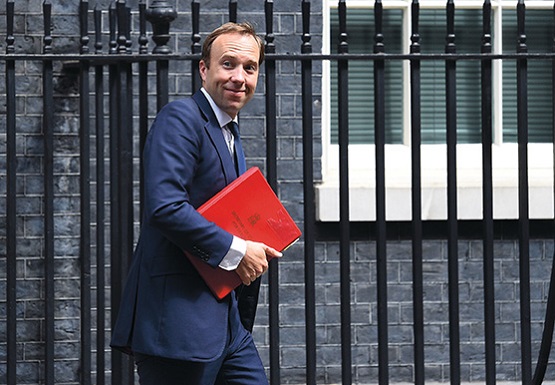New health secretary promises action on NHS workforce and diversity

Matt Hancock used his first speech as health secretary to hit out at the lack of diversity at among top NHS managers and call for an end to “tribal barriers” between managers and clinicians.
In a speech at West Suffolk Hospital on 20 July, ten days after he replaced Jeremy Hunt as health secretary, Hancock said diversity among the NHS leadership was “critical”, pointing out that only five NHS chief executives come from a black or minority ethnic (BME) background. “That has to change,” he warned.
“In many areas diversity is thriving. But not everywhere. And speaking frankly, the NHS leadership community must do more to reflect the wider workforce,” he added.
“Horrifying results”
Hancock said he was “horrified” by the results of the 2017 NHS Staff Survey, in which 12% of all staff, and 24% of BME staff, said they felt discriminated against at work. “The same trends apply to social care and we know its leadership does not fully reflect the diversity of its incredible workforce,” he warned.
“People cannot be expected to deliver world class care when facing bullying and harassment on this scale,” Hancock said. “So the culture must change, the NHS will be the better for it and I am determined to lead this change.”
Hancock announced he was setting up a “consultation exercise” on workforce issues, to be led by a panel of clinical and professional advisers from across the NHS and social care. “I want everyone who gives their lives to this amazing vocation to respond to our consultation with their views,” he said.
BME members demand action
MiP chief executive Jon Restell said: “It’s good that the secretary of state has spoken about the diversity of NHS leadership, but our BME members will want more than another white leader calling out under-representation. We need a clear action plan with accountability, outcome measures and specific actions such as BME representation on appointment panels, resources for networks and culture change at middle management level.”
Warning that bullying in the NHS “starts at the very top, in Whitehall and among regulators”, Restell added: “We must stop blaming individual senior managers for system-wide problems. The secretary of state needs to understand the intense operational pressures on this group of leaders, over half of whom have been in post for less than three years.”
In his wide-ranging speech, Hancock also promised to break down barriers between NHS professions and boost leadership training across the health and care system.
“Tribal barriers”
“It matters to clinical staff that their managers are good – everyone has their part to play,” he said. “Too often, getting the right people into these roles has been a struggle and I know some of you in management can feel overlooked or undervalued.”
He pledged to break down “the tribal barriers between management and clinicians to build a shared leadership agenda for the health service” and “remove obstacles” in order to encourage more doctors, nurses and health professionals to take charge of NHS organisations.
Restell welcomed Hancock’s early focus on the NHS workforce, but warned that “managers will be disappointed to hear nothing about social care funding – a huge missing piece of the jigsaw”.
Tough and rewarding job
Hancock, a former Bank of England economist, was previously the culture secretary, and is a particular enthusiast for the digital agenda in government. He replaced Jeremy Hunt, Britain’s longest-serving health secretary, who became foreign secretary following the resignation of Boris Johnson on 9 July.
Congratulating Hancock on his appointment, Restell said: “It’s both a tough and rewarding political job of huge importance to everyone in the country. As health and care managers, MiP members urge the new health secretary to make the workforce and social care funding his top two priorities.
“We would also welcome an early indication from Matt that he values the role of managers and other members of the support team in modern healthcare, and sees them as part of the solution to problems,” he added.
Related News
-

Job vacancy: MiP Assistant National Organiser
MiP is looking to recruit an Assistant National Organiser on a 14 month fixed term contract. Applications close: 4 March 2026.
-

FDA General Secretary Election 2026
Please find important information regarding the FDA General Secretary Election 2026 which MiP members may participate in.
-

Government proposal for sub-inflation pay rise “not good enough”, says MiP
Pay rises for most NHS staff should be restricted to an “affordable” 2.5% next year to deliver improvements to NHS services and avoid “difficult” trade-offs, the UK government has said.